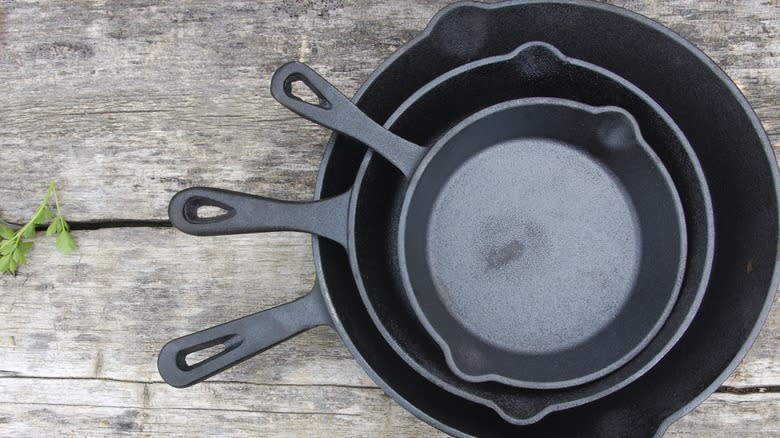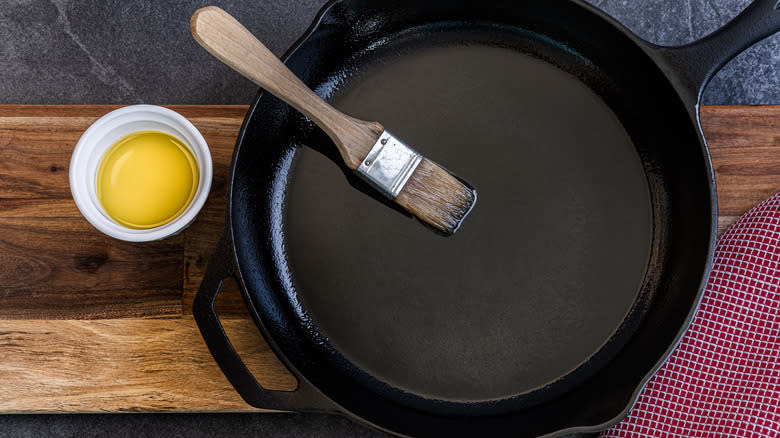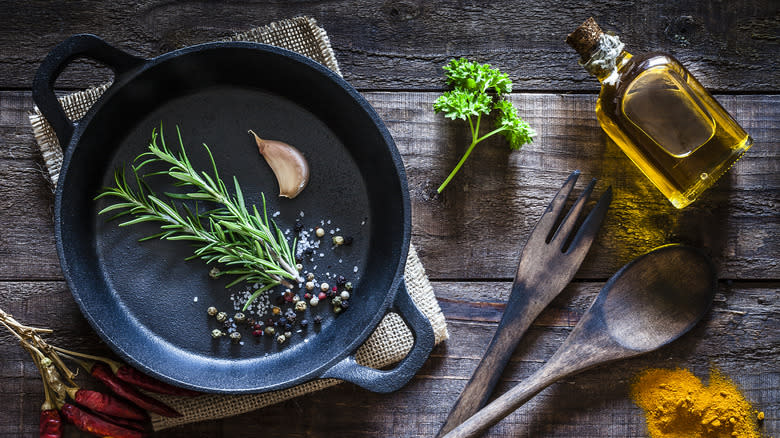You Can Season A Cast Iron Skillet With Olive Oil, But There's A Catch

A cast iron skillet is a useful kitchen tool, but between its weight and its unconventional maintenance routine, owning one can be a labor of love. However, this piece of equipment has been around for thousands of years for a reason -- when cared for properly, they really do stand the test of time in terms of durability and quality. If you choose to own one, one of the first things you must do is "season" the skillet to help make the surface more nonstick. You just need a little oil -- and if olive oil is all you have, then it's technically fine to use, but it depends on the type of olive oil.
The trick to using olive oil to season is to use the right kind of olive oil. Since these skillets get so hot, you'll need an olive oil with a high smoke point -- somewhere around 400 degrees Fahrenheit or above. For this reason, make sure to use either extra virgin olive oil, which can have a smoke point as high as 410 degrees Fahrenheit, or refined or light olive oil, which has a smoke point of up to 470 degrees Fahrenheit. While extra virgin will work if it's what you have on hand, the light variety also has a more neutral flavor, making it the best olive oil option to season your skillet with.
Read more: 8 Baking Sheet Mistakes You Want To Avoid
Yes, You Can Season Your Skillet With Olive Oil

When you season cast iron, you're essentially creating a nonstick, rust-resistant layer on top of the iron, making it last longer and better for general cooking use. The process is pretty simple, but it is an extra step compared to other types of cookware. Olive oil works as long as you choose a variety with a higher smoke point; you don't want the temperature of the pan to go above the oil's smoke point, or you'll have to re-season it more often, because it will degrade. Just wipe the oil all over the inside of the skillet with a paper towel; a super thin layer is enough. Then, bake the skillet in the oven at 350 degrees Fahrenheit for one hour. Make sure to let the pan cool completely before touching it.
Light olive oil is actually just olive oil that's been refined with heat. That process, which is absent in the making of extra virgin olive oil, gives the light version a milder flavor and higher smoke point. That neutral flavor is great for seasoning cast iron because it ensures the cooking process doesn't alter the natural flavors of your dish.
Tips For Seasoning Your Cast Iron Skillet

If you have extra virgin or light olive oil in your pantry, both will work for the seasoning process. Ideally, you want the most neutrally-flavored oil possible (while still maintaining a high smoke point). Other refined oils, like refined corn, grapeseed, or sunflower oil, are even better options, because they all have high smoke points of at least 450 degrees Fahrenheit and very neutral flavors.
If you do have to use olive oil, make sure it doesn't have a smoke point that's too low. Otherwise, you risk burning the oil off quickly and reducing the quality of the pan, and releasing potentially carcinogenic smoke, too (per the Dana-Farber Cancer Institute). Only add the thinnest possible layer of oil when seasoning your skillet, as adding too much can leave your skillet with a sticky residue.
You should always season cast iron before you use it for the first time, unless the brand specifically notes that it's been pre-seasoned. From there, re-season it at least once per month to keep it at its best quality.
Read the original article on Daily Meal.

